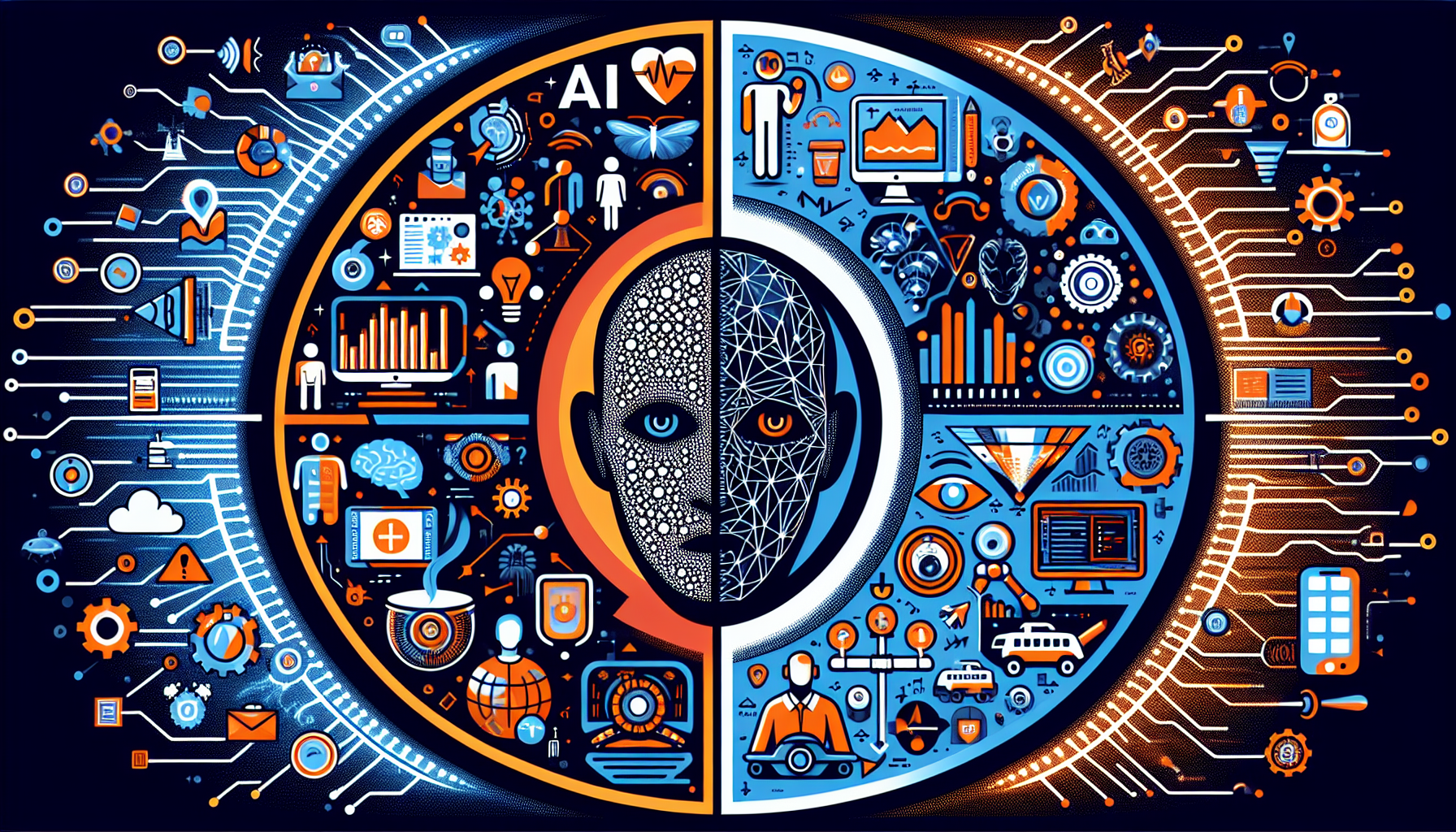Have you ever wondered about the impact of artificial intelligence (AI) in our everyday lives? From virtual assistants like Siri and Alexa to smart home devices and self-driving cars, AI technology has become an integral part of our daily routines. In this article, we’ll take a closer look at how AI is transforming various aspects of our lives, exploring both the benefits and potential challenges it brings. So fasten your seatbelt and get ready to embark on an extraordinary journey into the future of AI in our daily lives.

Exploring the Impact of AI in Everyday Life
Artificial Intelligence (AI) has become an integral part of our daily lives, shaping and transforming various aspects of human existence. From communication and entertainment to transportation and healthcare, AI has made significant advancements, providing us with countless benefits and conveniences. In this article, we will delve deeper into the impact of AI in these different areas, as well as examine the ethical considerations surrounding its use.
Overview of AI
To understand the impact of AI on everyday life, it is essential to have a general understanding of what AI is. AI refers to the simulation of human intelligence in machines, enabling them to perform tasks that would typically require human comprehension and decision-making abilities. This encompasses a wide range of techniques and technologies designed to mimic human intelligence and improve efficiency.
The concept of AI has been around for several decades, with significant milestones achieved in its development. Early pioneers such as Alan Turing and John McCarthy laid the groundwork for AI through their contributions in the mid-20th century. Since then, AI has evolved significantly, driven by advancements in computing power, data availability, and breakthroughs in machine learning algorithms.
AI can be categorized into three types: narrow AI, general AI, and superintelligent AI. Narrow AI, also known as weak AI, is designed to perform specific tasks within a limited domain, such as voice recognition or image classification. General AI, on the other hand, refers to AI systems capable of comprehending and performing any intellectual task that a human being can do. Superintelligent AI, the hypothetical future development of AI, surpasses human intelligence across all domains.
AI finds widespread application in various sectors, and its impact on everyday life has been significant. Let’s explore how AI has revolutionized communication, entertainment, transportation, healthcare, finance, education, retail, agriculture, and the ethical considerations surrounding its use.
AI in Communication
AI has radically transformed communication by enhancing various aspects of human interaction. One of the key applications of AI in communication is speech recognition. Through sophisticated algorithms, AI systems can convert spoken language into written text accurately. This technology has fueled advancements in voice-controlled virtual assistants like Siri, Alexa, and Google Assistant, enabling hands-free operation of devices and providing instantaneous responses to queries.
Another crucial aspect of AI in communication is Natural Language Processing (NLP). NLP allows machines to understand and interpret human language, facilitating communication between humans and computers. This technology has led to the development of chatbots, AI-powered conversational agents that can interact with users in a natural and intuitive manner. Chatbots are employed in customer service, enabling businesses to provide immediate and personalized assistance to customers around the clock.
AI in Entertainment
The entertainment industry has also witnessed a significant impact from AI. One of the key areas where AI has made a substantial difference is in personalized content recommendations. AI algorithms analyze user preferences, behavior, and viewing habits to suggest movies, TV shows, and music tailored to individual interests. This not only improves the user experience but also helps content providers in audience engagement and retention.
Chatbots are not limited to customer service – they have also found their way into the entertainment industry. These AI-powered conversational agents engage with users, providing interactive and personalized experiences. Virtual reality (VR) and augmented reality (AR) technologies are other advancements in AI that have revolutionized the entertainment industry. VR immerses users in a simulated environment, while AR overlays computer-generated content onto the real world, creating interactive experiences in gaming, movies, and other forms of entertainment.

AI in Transportation
In the realm of transportation, AI has brought about remarkable changes. Self-driving cars are one of the most prominent advancements, aiming to revolutionize transportation systems globally. AI technologies enable these autonomous vehicles to perceive their surroundings, make complex decisions, and navigate through traffic. These self-driving cars have the potential to improve road safety, reduce traffic congestion, and enhance mobility for individuals who are unable to drive.
AI also plays a crucial role in traffic prediction and optimization. By analyzing historical traffic data, AI algorithms can accurately forecast traffic patterns, allowing for efficient route planning. Additionally, smart traffic management systems utilize AI to optimize traffic signals in real-time, reducing congestion and improving traffic flow.
AI in Healthcare
AI has made significant strides in the healthcare sector, enhancing diagnostics, monitoring, and drug discovery. Medical diagnosis, a critical aspect of healthcare, has greatly benefited from AI. AI-powered systems can analyze medical images, such as X-rays and MRI scans, to detect abnormalities and assist doctors in making accurate diagnoses. This not only improves the accuracy and efficiency of diagnosis but also helps in the early detection of diseases, ultimately saving lives.
Health monitoring devices, powered by AI, have become increasingly prevalent. Wearable devices equipped with sensors can track various health parameters, such as heart rate, sleep patterns, and physical activity. AI algorithms analyze the data collected, providing valuable insights to individuals and healthcare professionals, enabling early intervention and prevention of health issues.
AI is also revolutionizing the field of drug discovery and development. With its ability to analyze massive amounts of data and identify patterns, AI can expedite the process of identifying potential drug candidates, reducing the time and cost associated with developing new medications. This paves the way for more efficient and targeted treatments for various diseases.

AI in Finance
In the realm of finance, AI has revolutionized many processes, improving efficiency and mitigating risks. One area where AI has made significant contributions is fraud detection. AI algorithms can analyze vast amounts of financial data, detecting patterns and anomalies that could indicate fraudulent activities. This ability to identify suspicious transactions in real-time has helped financial institutions in preventing fraudulent activities, safeguarding customers’ assets, and maintaining the integrity of financial systems.
Another application of AI in finance is algorithmic trading. AI algorithms can analyze market data, identify trading opportunities, and execute trades automatically, all at a much faster pace than human traders. This has led to increased efficiency and liquidity in financial markets, as well as reduced transaction costs.
Risk assessment and management have also been enhanced through AI. AI-powered systems can analyze a wide range of data, including historical market trends, economic indicators, and news sentiment. This enables financial institutions to evaluate and manage risks more effectively, making informed decisions and reducing potential losses.
AI in Education
The field of education has witnessed the impact of AI through personalized learning, smart content creation and delivery, and the development of AI tutors. Personalized learning leverages AI algorithms to create tailored learning experiences for individual students, adapting to their strengths, weaknesses, and learning pace. This approach allows students to learn at their own pace, increasing engagement and improving learning outcomes.
AI also plays a crucial role in smart content creation and delivery. AI-powered systems can generate educational content, such as quizzes, simulations, and interactive lessons, addressing specific learning objectives. The delivery of this content can be personalized and adaptive, catering to the unique needs and learning styles of students.
AI tutors, in the form of chatbots or virtual assistants, can provide personalized assistance to students. These AI-powered tutors can answer questions, provide explanations, and offer guidance, supplementing traditional teaching methods. This not only enhances the learning experience but also provides students with the flexibility to access educational resources anytime, anywhere.

Ethical Considerations of AI
While the impact of AI in various aspects of everyday life is undeniable, there are ethical considerations that need to be addressed. One such consideration is the potential for bias and discrimination. AI systems are trained on large datasets, and if these datasets contain biases or reflect existing societal inequalities, the AI systems may inadvertently reproduce and amplify these biases in decision-making processes. It is crucial to ensure that AI algorithms are fair, unbiased, and inclusive, avoiding discriminatory practices.
Privacy and security are also important ethical considerations. AI systems often handle vast amounts of personal data, raising concerns regarding privacy and data protection. It is imperative to implement robust security measures to prevent unauthorized access and protect sensitive information. Transparency and accountability in the use of AI systems are essential to build trust and ensure the responsible handling of personal data.
Additionally, the potential impact of AI on employment and job displacement needs to be considered. While AI has the potential to automate certain tasks and improve productivity, there is a concern that it may result in job losses and economic inequality. It is vital to develop policies and strategies that promote reskilling and upskilling of the workforce, ensuring a smooth transition into the AI-driven future.
In conclusion, AI has made significant inroads into our everyday lives, enhancing communication, entertainment, transportation, healthcare, finance, education, retail, agriculture, and more. The continued development and responsible implementation of AI have the potential to revolutionize these sectors, providing us with unprecedented convenience, efficiency, and personalized experiences. However, it is crucial to address the ethical considerations surrounding AI use to ensure fairness, privacy, and societal well-being. By harnessing the power of AI responsibly, we can navigate the evolving landscape of AI and reap its benefits while ensuring a sustainable and inclusive future.






Leave a Reply